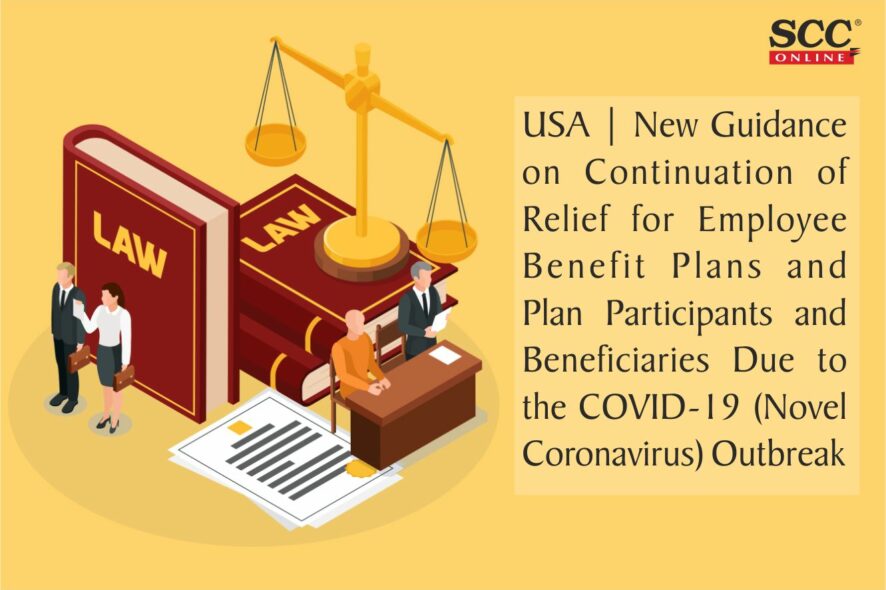The Department of Labor (DOL), the Department of the Treasury, and the Internal Revenue Service (IRS) issued notices providing guidance on the duration of the COVID-19-related relief provided by Employee Benefits Security Administration (EBSA) Disaster Relief Notice 2020-01 (“Notice 2020-01”) and the Notice of Extension of Certain Timeframes for Employee Benefit Plans, Participants, and Beneficiaries Affected by the COVID–19 Outbreak (“Joint Notice”)[1].
The Joint Notice and Notice 2020-01 (collectively “Notices”) provide relief for certain actions related to employee benefit plans required or permitted under Title I of the Employee Retirement Income Security Act of 1974 (“ERISA”) and the Internal Revenue Code (“Code”). The relief is focused on employee benefit plans, plan participants and beneficiaries, employers and other plan sponsors, plan fiduciaries, and other service providers impacted by the coronavirus outbreak.
The relief provided by the 2020 notices issued on 1st March, 2020 continued until 60 days after the announced end of the COVID-19 National Emergency or such other date announced by the relevant Agency or Agencies in a future notification. But under Section 518 of ERISA and Code Section 7508A(b), the disregarded period for individual actions “required or permitted” is expressly limited by law to a period of one year from the date the individual action would otherwise have been required or permitted. One year from March 1, 2020, is Feb. 28, 2021. The DOL says that “stakeholders have inquired about the continuation of relief beyond that date.”
Individuals and plans with timeframes subject to the relief that the 2020 notices provided, will have the applicable periods disregarded until the earlier of:
- one year from the date they were first eligible for relief; or
- 60 days after the announced end of the national emergency.
On the applicable date, the timeframes for individuals and plans with periods that were previously disregarded under the 2020 notices will resume. In no case will a disregarded period exceed one year. The first date upon which an individual or plan could be eligible for relief was March 1, 2020, the first day of the national emergency. Therefore, the earliest date upon which a disregarded period can begin to run again is March 1, 2021, including for periods during which an action is required or permitted to be completed that began before March 1, 2020.
Types of Deadlines Extended
For plan sponsors needing details on the type of deadlines affected by the original guidance and these Joint Notices, the following options are available. The date that participants and beneficiaries are considered to be “first eligible for relief” is the date by which they were otherwise required to take some action. Specifically, for participants and beneficiaries, the following deadlines are subject to relief:
- The 30-day period (or 60-day period, if applicable) to request special enrolment under ERISA section 701(f) and Code section 9801(f);
- The 60-day election period for Consolidated Omnibus Budget Reconciliation Act (COBRA) continuation coverage under ERISA section 605 and Code section 4980B(f)(5);
- The date for making COBRA premium payments pursuant to ERISA section 602(2)(C) and (3) and Code section 4980B(f)(2)(B)(iii) and (C);
- The date for individuals to notify the plan of a qualifying event or determination of disability under ERISA section 606(a)(3) and Code section 4980B(f)(6)(C);
- The date within which individuals may file a benefit claim under the plan’s claims procedure pursuant to 29 C.F.R. 2560.503-1;
- The date within which claimants may file an appeal of an adverse benefit determination under the plan’s claims procedure pursuant to 29 C.F.R. 2560.503-1(h);
- The date within which claimants may file a request for an external review after receipt of an adverse benefit determination or final internal adverse benefit determination pursuant to 29 C.F.R. 2590.715-2719(d)(2)(i) and 26 C.F.R. 54.9815-2719(d)(2)(i); and
- The date within which a claimant may file information to perfect a request for external review upon a finding that the request was not complete pursuant to 29 C.F.R. 2590.715-2719(d)(2)(ii) and 26 C.F.R. 54.9815-2719(d)(2)(ii).
*Tanvi Singh, Editorial Assistant has put this story together.
[1] EBSA Disaster Relief Notice 2021-01 | U.S. Department of Labor (dol.gov) https://www.dol.gov/agencies/ebsa/employers-and-advisers/plan-administration-and-compliance/disaster-relief/ebsa-disaster-relief-notice-2021-01






